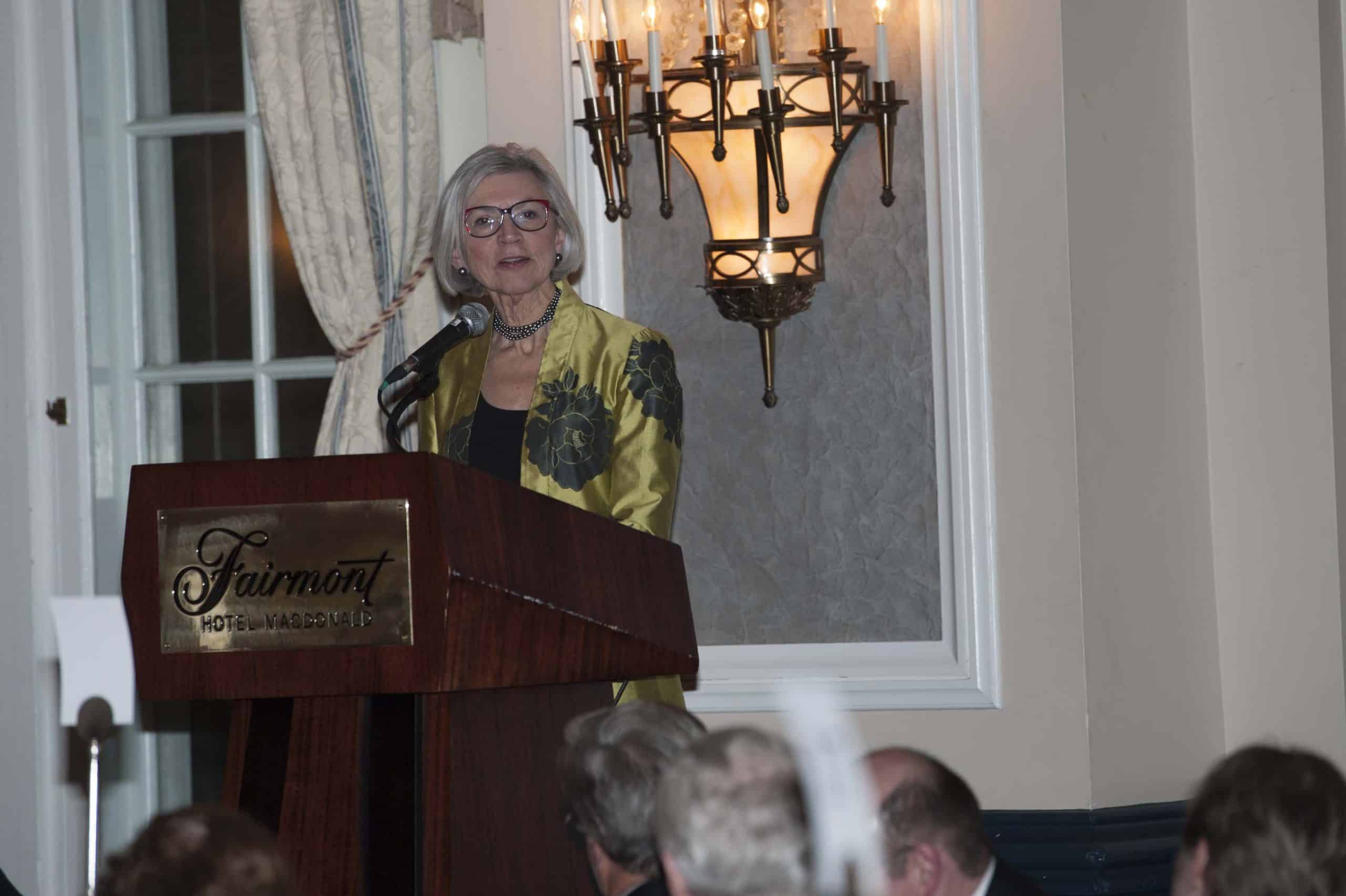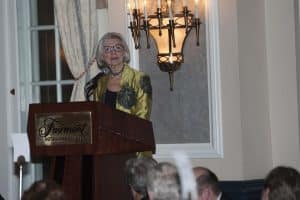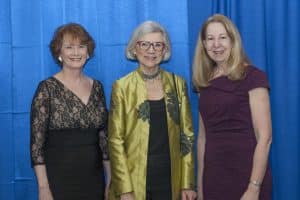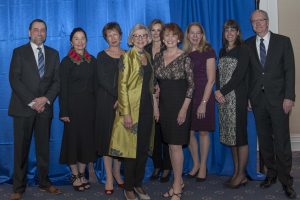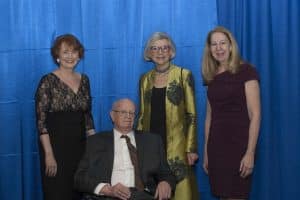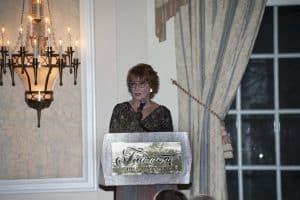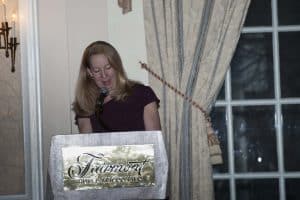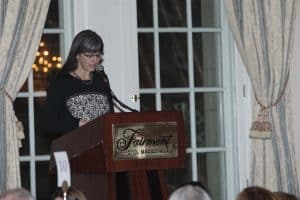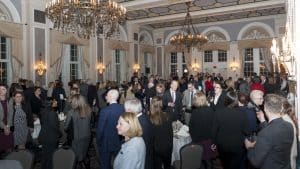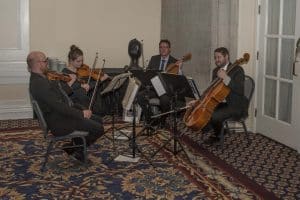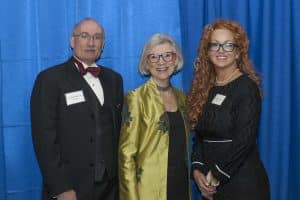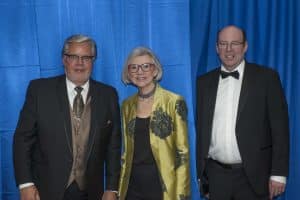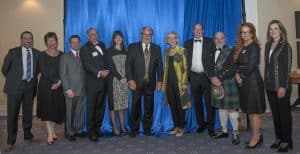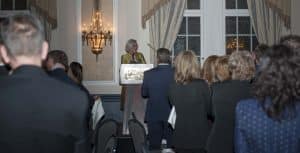LASA hosted its Annual Historical Fundraising Dinner in Edmonton on March 1, 2018 at the Fairmont Hotel Macdonald. We were delighted to welcome the Rt. Hon. Beverley McLachlin, retired Chief Justice of Canada, who spoke about past achievements and future challenges in the justice system.
Chief Justice McLachlin had a stellar career. She is a pioneer, and the first woman to become the Chief Justice of Canada. She was born in Pincher Creek, Alberta. She attended the University of Alberta where she received a B.A. (Honours) in Philosophy, a M.A. in Philosophy, and an LL.B. in 1968. She was called to the Alberta bar in 1969. Her first job was with the Edmonton firm of Wood, Moir, Hyde & Ross.
Following several years of practicing law in British Columbia, as well as teaching in the Faculty of Law at the University of British Columbia, Justice McLachlin began her judicial career in 1981 with her appointment to the Vancouver County Court. Following her appointment to the Supreme Court of British Columbia and then the Court of Appeal of British Columbia, she served as Chief Justice of the Supreme Court of British Columbia from 1988 until her appointment to Supreme Court of Canada in 1989.
In 2000, she was appointed to be the Chief Justice of Canada. Justice McLachlin retired on December 15, 2017 as Canada’s longest serving Chief Justice. She will be remembered for having written many leading judgments which will leave a lasting mark on Canada’s legal system and on Canadian society. Justice McLachlin championed the causes of judicial independence, Aboriginal rights and a wider access to justice.
The Hon. Catherine Anne Fraser, Chief Justice of Alberta introduced Justice McLachlin to a full room of guests. Chief Justice Fraser outlined for our guests several significant statistics related to Justice McLachlin’s judicial career. Justice McLachlin served seventeen years as Chief Justice of Canada. She sat as a Justice of the Supreme Court of Canada for twenty-eight years. When she retired, she had served nearly thirty-seven years as a judge. Chief Justice Fraser noted “Beverley McLachlin’s fingerprints are all over decisions in the post-Charter era,” and “though her judicial career in Canada has come to an end, her judicial and legal legacy will endure.”
Justice McLachlin then delivered a message filled with humour, remembrances, and a clear vision for the work that lies ahead. Justice McLachlin spoke about leadership. She explained that leadership was not about dictating your thoughts or beliefs to the rest of the group. Rather, leadership was about being a colleague, mentor, and a friend to other judges. She joked that upon becoming Chief Justice she was told that she would now have the “reins of power”, only to quickly realize that those reins weren’t attached to anything.
Justice McLachlin challenged the audience to both reflect on the past, and to look to the future. She commented that Alberta not only looks ahead, but that it also looks to its past to find the values that will define its future. Justice McLachlin spoke of a valuable legal legacy that has been passed down from previous generations by Canadian lawyers and judges. Mentioning traditions based on the Common Law and the independence of the judiciary brought to Canada by Great Britain, she also commented on Indigenous legal traditions and processes that were present prior to Canada coming into existence. She noted that we are now only realizing how useful and profound those traditions are.
Justice McLachlin spoke about the history of law and justice system in Alberta. She started by describing the work of the magistrates in the North West Territories in 1867. She noted that early Alberta justice was not what we today would consider appropriate. She traced how even though the intention was to choose professional, independent judges, in practice, the judges of that time lacked formal legal training. Many judicial officials were former or present police or military men. Justice McLachlin argued that their impartiality was in doubt.
With increased settlement in Alberta, the need for more judges became apparent. Justice McLachlin observed that with the trial of Louis Riel there was a scramble to replicate the British jury system. The need to use judges from Eastern Canada to hear the trial demonstrated the need for more judges. In 1887, the Supreme Court of the North West Territories was established with separate trial and appellate divisions.
Justice McLachlin then traced how past values and traditions inform present practices and future directions. She spoke of integrity, fairness, equality, and responsibility. She spoke of learning these values as a child growing up in Pincher Creek, Alberta. She related how Pincher Creek was quite the breeding ground for exceptional people. Together with a group of prominent surgeons and physicists, Pincher Creek produced four lawyers who would go on to become Chief Justices of Superior courts across the country. She stressed that Pincher Creek was not a centre of written rules, litigation, and complex commercial transactions, but rather a place where legal culture was based on unwritten legal norms.
Justice McLachlin argued that Alberta’s early legal culture was based on these simple values. It was a legal culture with an emphasis on individuals and openness. She noted that there was a true openness to change and adaptation. She pointed out the role of the Alberta’s Famous Five. They fought their way through every level of court in the British Commonwealth to obtain the rights for women to hold public office. They brought about a change in the law to recognize women’s rights and equality within society. Justice McLachlin held the Famous Five case out as an example of how the Constitution adapted to a changing society.
She urged the audience to count the gains society has made, but to also keep in mind the immense challenges ahead. Justice McLachlin highlighted two urgent tests facing today’s justice system.
The first of these challenges she mentioned was the the delay and expense in securing legal assistance and dispute resolution through the court system. Justice McLachlin repeated her well-known view that there must be access to justice for all. She argued that for many, access to the justice system is an abstract concept. She noted that access is there for the wealthy, but a majority of the population cannot afford legal representation. Justice McLachlin suggested that the law and the courts belong to the people, and that access to justice should be a fundamental right. As the legal system depends on public confidence, she reminded us that unless the future of the legal system makes this right a reality, the fate of the entire system could be in jeopardy. Justice McLachlin articulated a four-part solution. First, the legal system must be made available to those who are not wealthy. Second, the legal and judicial communities must improve public legal education. Third, there must be improvement in scheduling and court processing. Lastly, there must be an increasing role for the establishment of alternative means to resolve family and civil disputes.
The second challenge facing the future that she identified was the need to achieve reconciliation between Indigenous and non-Indigenous peoples within the justice system. She explained that the problem has existed for a long time, but is now becoming a crisis. For much of Canada’s history, Indigenous people did not see the justice system as their own. Instead they saw it as an alien, white system imposed on them from the outside. Justice McLachlin argued that this is no longer sustainable. She noted the over representation of Indigenous people in the courts and prisons and the questions about whether the justice system functions fairly for Indigenous people. She commented on the failure to incorporate Indigenous concepts of justice into our system of law. Though she acknowledged progress in this area, such as by realizing the value of sentencing circles and reconciliation of offenders back into the community, she stated that there remain plenty of hurdles to be overcome. She concluded on this issue by stating that this task of harmonizing Indigenous ideas of justice with European ideas of justice will not be easy, but the task is necessary to secure the future of Canada.
Despite these two urgent challenges, she claimed that there is cause for hope for a number of reasons. She explained that Indigenous people now play a greater part of the justice system having studied law and becoming lawyers in provinces across the country. They are taking up a place in the legal system and changing it for the better. She traced how the law has been spurred by the guarantee of Indigenous property and cultural rights that are enshrined in Section 35 of the Charter of Rights and Freedoms. She observes that since the Commission on Truth and Reconciliation, people from all ranks and walks of life have demonstrated a commitment to reconciliation between Indigenous and non-Indigenous Canadians. Justice McLachlin eloquently set the bar high for the goal to which we should all aspire by saying that she “dreams of a justice system that is respected and embraced by all Canadians of all walks of life and all backgrounds, including Indigenous People.”
She concluded by noting that our legal system is the way in which our system can meet these twin challenges of access to justice and reconciling Indigenous and non-Indigenous Canadians within the justice system. She noted how the values we inherited from our past will point the way towards solutions for problems we currently face. These values are coupled with a shared understanding of the way forward. She explained that the way forward is not to divide, but respect our differences and work together for a better future.
Justice McLachlin suggests that the law is the framework that regulates society. She describes the law as a powerful tool to ensure that the men and women of our time pass on to later generations of Albertans a land of undiminished beauty and promise, and a society grounded in integrity, fairness, equality, and responsibility.
The Legal Archives Society of Alberta wishes to thank all those who attended this wonderful evening and who continue to support our work to preserve and promote Alberta’s legal heritage. LASA wishes to thank all the organizers of the event, especially Wayne Malcom Schafer, Q.C. as well as the evening’s speakers who helped make this a memorable evening. LASA wishes to thank the Rt. Hon. Beverley McLachlin, who accepted our invitation. We at LASA, and the legal community as a whole hope to respond to Justice McLachlin’s challenge to have us do better and make a difference.
